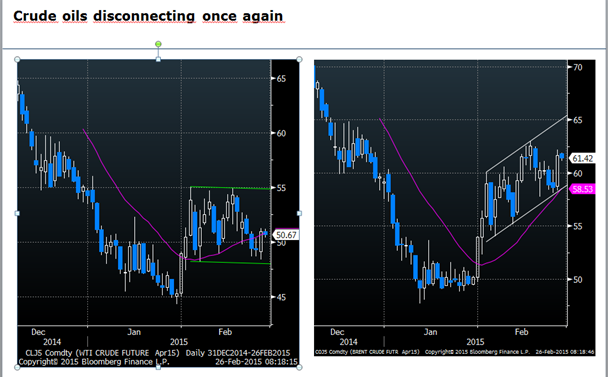- Brent/WTI spread widens to highest in more than a year
- WTI price continues to stand still as US inventories rise again, says Hansen
- Opec reap benefits from Brent's rise and market share strategy
- China's stocks in sharp rally after hints on fiscal policy move grow stronger
- Europe and Home Depot (NYSE:HD) is a Yes, but Royal Bank of Scotland (LONDON:RBS) Group PLC (NYSE:RBS) is a No, says Garnry
- Bunds hit all-time record and continue to hit new highs this morning, says Boye
Opec's blueprint?
The spread between Brent crude and WTI has widened to a 12-month plus high of $10.78/barrel and someone very high up in Opec is probably enjoying the wryest of smiles as we speak.
Far be it for from the floor to suggest a masterplan has been at work here, but with the global oil cartel's pricing linked to the Brent benchmark, the hold market share at-all-costs strategy embarked upon at its November meeting is starting to pay dividends.
"This is a really nice situation for Opec and its members with their profitability going up while WTI stands still and that means there is very little support for the shale sector in the US," says Saxo Bank's head of commodities, Ole Hansen.
Demand is on the rise for Brent, according to a senior Opec official yesterday from Saudi Arabia, helping to propel it to $61.45/barrel at 0755 GMT today, a stark contrast to WTI's laboured $50.73/b.
Yet another huge increase in US oil inventories in yesterday's EIA report is stymieing any hopes WTI has of joining Brent on its upward trajectory with inventories at main US storage hub Cushing rising to 48.6 million barrels.
That has also seen the contango between the front-month WTI price and the second-month widen to $2/b leaving the US benchmark seemingly marooned in "rangebound territory for a while," says Hansen.
Hansen suggests that while there may be a selloff this morning, Brent crude could yet go higher to test the $63/b and even the $65/b area while WTI "is going nowhere fast". 
China's New Year gift?
Meanwhile, we could be about to witness another rally in Chinese equities, perhaps not unlike the one we saw in the autumn of 2014.
"There has been a nice rally in mainland Chinese stocks on talk that the government will take steps to address the ongoing domestic slowdown," says Christoffer Moltke-Leth, speaking live from Saxo Bank's Singapore hub. "Prime minister Li Keqiang has called for a more active fiscal policy and the People's Bank of China also issued a report that mentioned the possibility of monetary easing."
This being China, the timing could well be part of a coordinated effort to ready markets for some kind of accommodation with key meetings in March due to set the government budgetary agendas for the year, says Moltke-Leth.
Despite that, AUD/USD, which normally reacts well to any positivity out of China slumped 30 pips during trading to an intraday low of 78.40 driven by the prospect of a possible RBA cut next week after a disappointing Q4 private sector capex print.
Concertina effect
Elsewhere in currency markets and specifically in the FX Options' space, the concertina effect is most definitely at the squeeze phase with vols on EUR/USD one-month at-the-money down to 8.3 from yesterday's 9.1 and Tuesday's 10.6.
It's a similar story for USD/JPY one-month, says the desk's Kim Nydahl Grønlund from the Copenhagen floor, with vols at 8.1 from 8.8 Wednesday and 9.6 on Tuesday.
"Options are lacking a catalyst with Yellen and Greece now seemingly out of the way," he says. These sharp moves down in vols are likely to continue."
Little house on the prarie
The prospects of a housing boom in the US meanwhile, marks Home Depot out as an "alpha" pick after it posted very strong results earlier this week, says head of equities at Saxo bank, Peter Garnry.
"it's got a very good balance between quality valuation and price action and this is being helped by what is beginning to look like a bullish US housing recovery," he says.
Garnry also is sticking firmly to his conviction that Europe is "the place to be" in 2015, if equities is your thing. "The market may already be up 10% but that train has most definitely not left the station and it is looking extremely good for European equities."
Garnry cites very strong German confidence figures this morning and the prospects of a 4% rise in Irish GDP as yet further indications that the signs are looking good for Europe despite the well-documented headwinds.
He is less sanguine about the prospects for beleaguered RBS, however, which, while narrowing its losses this morning from £8.5 billion to £3.5bn, is not one that investors should be looking at yet.
"There is so much uncertainty about execution and the business strategy and I think investors are getting a little bit carried away because of the improving UK economy," he says.
Bunds bounce
Finally, German bunds bounced to a record 159.58 yesterday and then topped that with 158.70 this morning, says the Fixed Income's Michael Boye.
"The yield is up by 32 basis points," he says, but adds a warning on Greece.
"There is still a long way to go on Greece where it is a developing story and we are certainly not out of the woods on that one," he says.
